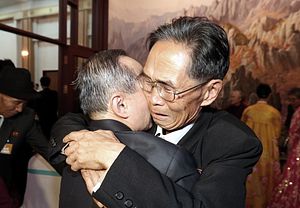South Korea’s Unification Minister Kwon Young-se officially proposed talks with North Korea to discuss the issue of separated families.
“The South and the North should confront the painful parts of the reality. We must solve the matter before the term ‘separated families’ disappears,” Kwon said during a press briefing on Thursday.
Since South Korean President Yoon Suk-yeol took office in May, Seoul has tried to entice Pyongyang to return to the negotiating table to deal with the escalating tensions on the Korean Peninsula. Due to Yoon’s hawkish remarks, including emphasizing Seoul’s preemptive strike options over the North’s nuclear and missile threats, however, Pyongyang has explicitly ruled out the possibility of engagement with the Yoon administration. Kim Yo Jong, the powerful sister of the North Korean leader Kim Jong Un, made that clear in her belligerent statements last month.
Despite the deadlocked inter-Korean dialogue, Kwon held a press briefing two days before the Chuseok national holiday to address the heartbreak Koreans from both sides have suffered over the division of the two Koreas.
“We need to use all possible means immediately to come up with quick and fundamental measures,” Kwon said.
While emphasizing that there is not much time left based on the decreasing number of separated families, Kwon added that Seoul is “ready to make every effort to alleviate the pain of division anytime, anywhere, in any way possible.”
The term “separated families” refers to those who were divided from their family members – parents, children, siblings – during the Korean War. According to data published by the Unification Ministry, 66 percent of 43,000 separated family members are over 80 years old, demonstrating the urgency of resolving the issues of separated families.
However, Kim Yo Jong already made clear that North Korea would not seek inter-Korean dialogue during Yoon’s term. Pyongyang has repeatedly demanded that Washington and Seoul make concessions, including lifting sanctions and permanently halting the joint military exercises, as preconditions for renewing the stalled dialogue; it is unlikely to make a dramatic change in its firm stance to accept Kwon’s proposal.
Pyongyang is also unlikely to welcome Kwon’s proposal due to its concerns over the possible spread of COVID-19 during meetings of separated families.
Kim Jong Un already declared victory against North Korea’s first admitted COVID-19 outbreak last month, but outside experts are skeptical that the North was able to bring the pandemic under control so quickly, given the near complete lack of vaccines or necessary medical equipment.
Kwon also recognized that the North may prefer video reunions due to the COVID-19 situation, but it is unclear whether those who have applied for reunions would be satisfied with a virtual alternative.
Since the end of the 1950-53 Korean War, there have been 21 meetings allowing some separated families to reunite. The last reunion took place in August 2018, at a time when inter-Korean relations were reinvigorated by the inter-Korean summits and the historic first summit between U.S. President Donald Trump and Kim Jong Un.
Under previous progressive administrations in the 2000s, South Korea provided a large amount of rice and fertilizer to North Korea as a de facto cost for hosting reunions of separated families. However, Kwon said that “the government is not examining other particular incentives for humanitarian issues,” saying that the issue of separate families is a humanitarian concern to which “North Korea must also respond” with no preconditions.
South Korea has normally used the channels of the Red Cross to discuss reunions of separated families with North Korea. Kwon said that, at this time, his ministry is trying to send its proposal to North Korea directly through the joint liaison office. In this context, the bid for family reunions could be seen as a political gesture designed to open direct negotiations.
In order to resolve the North’s nuclear threats, Yoon has proposed his “audacious initiative,” which offers economic packages for Pyongyang once it takes steps toward denuclearization. Kwon also said that “the issue of separated families is closely associated with the audacious initiative” and pledged to “continue to push forward on both issues hand in hand.”
Yoon’s audacious initiative was harshly downplayed by North Korea, with Kim Yo Jong calling it a copy of the previous Lee Myung-back administration’s failed “Denuclearization, Opening and 300” policy.

































